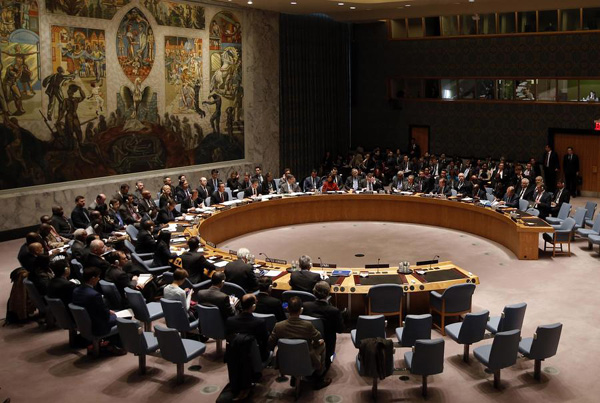China ends UN council presidency, eyeing 70th birthday
(Xinhua) Updated: 2015-02-28 10:58
 |
|
Chinese Foreign Minister Wang Yi (center L) presides over a meeting of the United Nations Security Council at UN headquarters in New York, February 23, 2015. [Photo/Agencies] |
UNITED NATIONS - Ambassador Liu Jieyi of China, the rotating president of the UN Security Council for February, wrapped up "a very busy month" on Friday, looking back at procedural efficiencies introduced and looking forward by initiating events marking the world organization's 70th anniversary.
"This month has been a very busy month," he told reporters at an end-of-month briefing. "The Chinese presidency was guided in its work by being objective, impartial, efficient, results- oriented, open and transparent."
The Security Council presidency rotates monthly among members. France will serve as the March presidency.
"By and large the work of the council has been accomplished in a smooth way," Liu said. "This month the council held 20 public meetings, 15 informal consultations to consider over 20 agenda items, including Syria, the Middle East, Palestine, Iraq, Yemen, Libya, Kosovo, Guinea Bissau, Somalia, Abiyei, South Sudan and Ukraine."
He added that it also adopted seven resolutions and two presidential statements while issuing 14 press statements.
A resolution, which is voted on, carries the weight of international law while a presidential statement is agreed by consensus, read out at a formal council meeting and entered as an official UN document.
Liu expressed his pleasure in that the council increased communications with President Sam Kutesa of the UN General Assembly, of which all 193 UN countries are members.
"The intention was to enable the president of the General Assembly (PGA) to know more about what we had in mind about organizing the work of the council in the month of February," said the ambassador, adding that the move meant the council also benefited from the PGA's perspective in the work of the Security Council.
The Beijing envoy said an additional benefit to the world organization that he experienced was "to the extent possible to organize the work of the Security Council in the larger context of the important events of the year for the General Assembly, for the United Nations in general."
Liu cited an example of efficiencies introduced during this presidential term.
"What we tried to do was to front-load the questions posed to the briefers," he said. "In the past questions were posed to the briefers after the briefing."
The briefers, usually at an open meeting, then responded, extending the meetings.
"What we did was to ask council members to pass on to us questions they would pose to the briefers beforehand and we conveyed these questions to briefers so that they came prepared and they were able to incorporate the answers to the questions in their briefings," Liu said.
"Altogether we collected about 110 questions for the briefings and that much time was saved in the work of the council," Liu said. "On average we managed in February to complete the informal discussions on any one given topic within two hours. So we can see the result of such an innovation."
- UN debate showcases China's growing global role
- UN debate highlights China's commitment to world peace
- UN Charter indispensable in maintaining peace, stability: Chinese FM
- Foreign minister to preside at UN
- Libya appeals to UN for aid in combating terrorism
- UN chief sends New Year greetings
- UN urges more efforts in last phase of combat Ebola
- UN Security Council slams IS murders of 21 Egyptians
- UN urges Yemen's Houthis to engage in negotiations
- China upholds UN's role
- UN shows appreciation for China’s role in fighting Ebola
- Food security situation improves in Eastern Africa: UN






